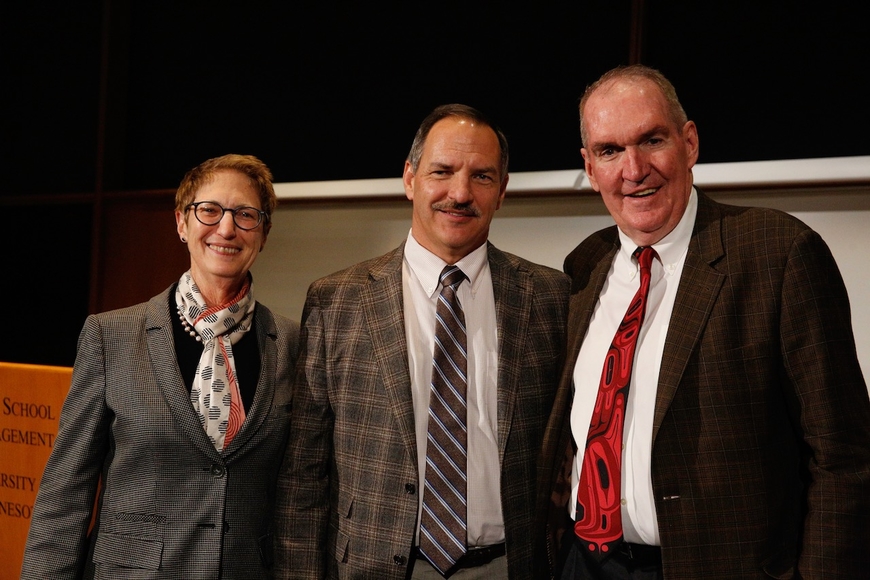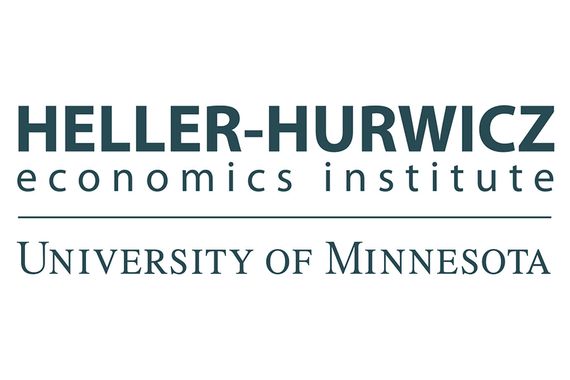The Economics of Trade Wars: 25 Years of NAFTA
On October 30, the Heller-Hurwicz Economics Institute and the Carlson Global Institute co-hosted an event to explore what economic research says about today’s trade policy challenges. With global trade issues making headlines daily and analysts carefully watching for signs of a recession, what advice do economic research and history have to offer? Will USMCA, the "new NAFTA," benefit its member nations? What trade policies have been most beneficial to Minnesota's businesses and residents? The panel discussed these questions and more.
The event brought together three panelists with expertise on the issue of trade:
- Pete Kappelman is Senior Vice President of Member of Government Relations at Land O' Lakes. He has served on the boards of the National Milk Producers Federation, the National Dairy Promotion and Research Board, and the U.S. Dairy Export Council. He also served as an Ag Policy Advisor to the Administration for the United States Department of Agriculture and the Office of the United States Trade Representative. Pete is a fourth-generation farmer; along with his wife and three adult children he runs Meadow Brook Dairy Farms with 450 milking cows and 1,100 acres of cropland.
- Timothy Kehoe is a Distinguished McKnight University Professor in the Department of Economics. Tim serves as an advisor at the Federal Reserve Bank of Minneapolis and a research associate at the National Bureau of Economic Research. An expert in macroeconomics and international trade, has advised several foreign governments regarding foreign trade agreements. Tim earned his PhD from Yale University and his bachelor’s degree from Providence College.
- Stefanie Lenway is Dean of the University of St. Thomas Opus College of Business, a position she has held since 2014. Previously, Stefanie served as Dean of the Broad College of Business at Michigan State University and as Dean of the College of Business Administration at the University of Illinois at Chicago. She was also previously served as Associate Dean for Graduate Programs at the Carlson School. Dean Lenway holds both an MBA and a Ph.D. in business and public policy from the Haas School of Business at the University of California, Berkeley.
Throughout the course of the discussion, Kappelman, Kehoe, and Lenway shared their unique views on the overall success - and shortcomings - of NAFTA over the past 25 years, as well as the promise of the proposed USMCA trade agreement. After sharing a broad historical overview of globalization and trade policy, including how NAFTA came to be, the group agreed that NAFTA has benefitted all parties. The agreement has been largely positive for the automobile and agriculture industries in particular, although there have been challenges.
together the three lead architects of NAFTA.
Read their thoughts on the future of NAFTA.
While we know that free trade increases average incomes and average welfares, it doesn't necessarily help everybody. On the topic of inequality, Lenway observed that NAFTA has created problems. "Social problems, infant mortality, the opioid crisis have sort of seeped into those regions of the country that have become peripheralized." Kehoe added, "In the overall economic advances we're making, some people are being left behind. And trade and foreign investment are easy things to blame for that. Most of it's due to automatization and increases in productivity. We're producing more and more goods; it's just [that] we need less and less workers to do that. Now, that's good for us as consumers, but it's not good for the workers who are losing their jobs."
All three panelists agreed that, while innovation drives much more economic dislocation than trade, we need to be creative in developing incentives, retraining programs for younger workers, some kind of compensation for older displaced workers, and regional development policies.
This event was sponsored by:




